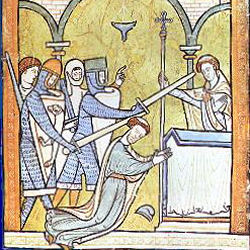The fifth day of Christmas is St Thomas Becket’s Day
1170 The murder of Archbishop Becket.
The twelfth century saw the rise of powerful monarchies in western Europe whose kings were intent on increasing their revenues and scope of jurisdictions. This often brought them into conflict with the papacy, their national churches and the feudal nobility. In England, Henry II (1133-89) sought to repair the damage done by twenty years of anarchy and civil war. He asserted royal power to judge cases hitherto reserved to the local lords; he took back royal lands lost during the chaos; he centralized tax powers; and he intended to reduce the independence of the English church. To the latter end he named his friend Thomas Becket Archbishop of Canterbury.
Becket was not a priest, though like most educated men of his time he took minor religious orders. He had studied canon law, been employed as a diplomat, and served Henry as Lord Chancellor. When Theobald of Bec died in 1162, Henry engineered the election of Becket who to the dismay of the king, took his new priestly vows seriously: he entered on a life of asceticism and defence of the liberties of the English church. In 1164 Henry attempted to introduce the Constitutions of Clarendon, 16 statements limiting the independence of the church, including an end to the abuses of “benefit of clergy” by which priests could not be tried by secular courts. Becket refused to agree and to avoid royal intimidation fled to the Continent. Pope Alexander III brokered a return to England for the Archbishop but Becket soon began opposing the royal will again, this time by excommunicating those clergy who had sided with the king.
When news of Becket’s actions reached Henry in Normandy, the furious monarch is said to have uttered a provocative complaint. Most historians have claimed that Henry said “Will no one rid me of this turbulent priest?” but others have attributed to Henry the less pithy plea “What miserable drones and traitors have I nourished and brought up in my household, who let their lord be treated with such shameful contempt by a low-born cleric?” Taking this as a command, four of his knights crossed the Channel to Canterbury where they murdered Becket inside the cathedral.
This outrage caused an international reaction. The pope quickly canonized Becket; Henry II submitted to a whipping by the monks of Canterbury; and the site of Thomas’s tomb became one of Christendom’s great pilgrimage attractions, as we can see in Chaucer’s Canterbury Tales.
St Thomas Becket is patron saint of London, the English secular clergy, those who hunt with hawks and hounds and those who have lost their horses.
